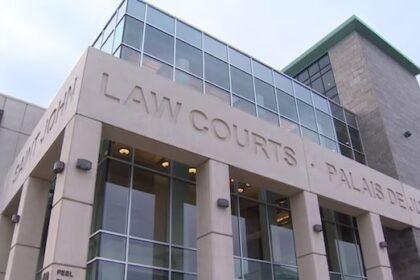The rate of police-reported impaired driving incidents on P.E.I. fell slightly last year but remained the highest among all provinces, according to new data from Statistics Canada.In 2024, P.E.I.’s rate was 489 incidents per 100,000 people, about three times the national average and 5.5 per cent lower than it was in 2023.The Island has topped the provincial rankings since 2022.It is important to note that what is being measured here is incidents reported by police, not the rate of those actually driving impaired, which is impossible to know.Cpl. Gavin Moore, media relations officer for P.E.I. RCMP, said the force, which polices 63 per cent of the province, has laid charges in more than 1,000 impaired driving cases within the past five years.”Looking at some of our fatal collisions from years gone by, we can see that impaired driving is one of three major factors that have contributed to road fatalities here in P.E.I., the other two being speeding and lack of seat belt use, and this is a preventable factor in fatalities,” Moore told CBC News.Cpl. Gavin Moore of the P.E.I. RCMP says impaired driving has shifted from being primarily an alcohol issue to one where drug impairment, especially from cannabis, is a significant portion of arrests. (Shane Hennessey/CBC)P.E.I. RCMP numbers show impaired driving charges laid by the force have increased over the past five years, from 192 in 2020 to 242 in 2024.Last year’s total includes a case that resulted in two deaths and another that caused injury to one person.Shift from alcohol to drugsMoore said the nature of impaired driving has changed.”Traditionally, this was almost exclusively an alcohol issue, and as time has gone by, we do see now a number of other cases of impaired driving by drug, which now makes up about a third of those arrests,” he said.”The vast majority of those were cannabis cases.”Statistics Canada numbers back that up.The rate of police-reported impaired driving incidents on P.E.I. spiked in 2019 — the first full year after cannabis was legalized in Canada — rising 55 per cent compared with the previous year. Since then, rates have generally declined, returning to roughly the levels seen in 2018.One factor behind this decline has been a drop in alcohol-related impaired driving. In 2024, there were 547 incidents overall — nearly one-third fewer than in 2019.However, drug-related impaired driving has been moving in the opposite direction.In 2024, police recorded 196 such incidents, more than double the 75 cases reported in 2019.Moore said that shift has changed the tools and tactics police use to address impaired driving. RCMP officers now have roadside screening devices designed to detect drug impairment.”Some officers are also trained in detecting different types of drug consumption, and can ask for field sobriety tests for individuals to go through,” he said.He added that officers “routinely” demand blood samples when needed. Those samples are analyzed in a lab to provide precise evidence of drug levels.Beyond patrols and checkpointMoore said RCMP’s strategy includes a provincial traffic services unit of six officers who specialize in road safety enforcement.In addition, he said every RCMP detachment has officers who know their local communities well and understand where impaired drivers are more likely to be. These officers carry out regular patrols to target problem areas.The RCMP also sets up checkpoints, particularly during high-risk times such as concert events and holiday weekends. Moore said the checkpoints serve two purposes: stopping impaired drivers directly and sending a message that the risk of getting caught is high.Police checkpoints are used during high-risk times, like the Cavendish Beach Music Festival weekend, to stop impaired drivers and deter others. (Jane Robertson/CBC)Part of the force’s deterrence strategy also involves public outreach, particularly on social media, where P.E.I. RCMP regularly post updates on their impaired driving enforcement efforts.”We hope that that can help dissuade people from making those choices,” Moore said.Islanders themselves play a key role, he added.”A third of our impaired driving arrests come from tips from the public, and we want all Islanders to know that calling 911 is the right choice anytime you see a suspected impaired driver.”‘It’s a serious problem’MADD Canada CEO Steve Sullivan said it’s not surprising P.E.I. continues to have the highest impaired driving rate among provinces, given the trend he’s seen over the years.”When you see the numbers consistently highest or among the highest for P.E.I., that’s concerning,” Sullivan said.”Clearly, it’s a serious problem on the Island.”Steve Sullivan, CEO of MADD Canada, says P.E.I.’s impaired driving problem could be addressed through measures like immediate roadside license suspensions and expanded public transit, especially in rural areas. (Submitted by Steve Sullivan)MADD Canada has recently been in discussions with the provincial government about bringing in immediate roadside licence suspensions for impaired drivers — a system that’s already in place in provinces such as New Brunswick, Alberta and British Columbia — which Sullivan said is a more efficient way of dealing with impaired drivers.Another key measure, he added, is expanding public transportation, particularly in rural parts of the Island where isolation, limited transit options and few alternatives make communities more vulnerable to impaired driving.”If we want to reduce impaired driving numbers, we need to give people choices to not drive impaired and still get home if they need to get home,” Sullivan said.But he stressed lack of transit is not an excuse.”Just make that plan in advance,” he said. “You have fewer options in rural communities, but you still have options, and it’s about your safety, it’s about your passenger safety and about everybody else on the road.”Immediate roadside suspensions on the tableIn a statement to CBC News, the provincial government said P.E.I. has some of the strictest impaired driving laws in Canada, and is the only jurisdiction where jail time is typically ordered on a first conviction.The province said it is exploring immediate roadside licence suspensions.”The province has also invested in RCMP traffic unit training to detect impaired drivers, collaborated with policing and public safety partners to increase the number of sobriety checkpoints, and increased investments in educational and public awareness campaigns,” the statement reads.It added that work is underway to improve public transit across the Island as another way to address impaired driving.
P.E.I. still tops impaired driving rate among provinces despite small decline in 2024











